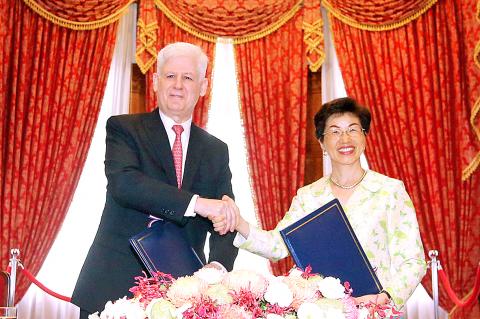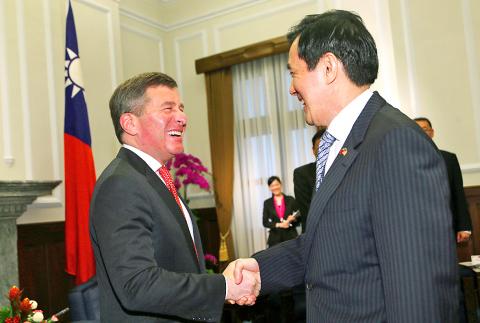Taiwan and the US yesterday signed a memorandum of understanding on the Global Cooperation Training Framework to enhance bilateral cooperation in responding to global challenges, a move visiting US Assistant Secretary of State for Economic and Business Affairs Charles Rivkin said would “take our partnership to new areas and a new level.”
Before witnessing the signing ceremony at the Taipei Guest House, Rivkin had a closed-door meeting with President Ma Ying-jeou (馬英九) at the Presidential Office Building to discuss what he said were “matters of importance to our economies.”
Rivkin, responsible for managing trade negotiations, investment treaties and other economic issues at the US Department of State, is the highest-ranking official to have visited Taiwan since his predecessor Jose Fernandez in 2012.

Photo: CNA
In remarks to reporters before his meeting with Ma, Rivkin said people in the US feel “a special bond” with Taiwanese for various reasons.
People in the US admire the robust, prosperous, orderly and free society Taiwan has built, and they share a belief that creating an environment conducive to expansive entrepreneurial activity and innovation is important to continuing economic prosperity, Rivkin said.
Citing statements made recently by various US officials on Taiwan-US relations, Ma said he was “positive” about Taiwan’s chances as a second-round candidate to join the Trans-Pacific Partnership.

Photo: CNA
Ma said he hoped negotiations over a bilateral investment agreement would gain ground.
Rivkin told attendees to the signing ceremony that the framework would not only support broader Taiwan-US relations, but also serve as a platform to enhance their joint engagement in the Asia-Pacific region and the world.
Under the framework, “two like-minded partners will work to create new opportunities to demonstrate the meaning of global citizenship,” Rivkin said.
“The framework is a milestone that will bring into full focus Taiwan’s dramatic transformation from an international aid recipient to an aid provider. This framework will provide Taiwan [with] a new venue to tell its story in a way that may inspire others to follow its successful development path,” he said.
Deputy Minister of Foreign Affairs Andrew Kao (高振群) said Rivkin’s attendance of the ceremony was a testament to the strength of Taiwan-US relations.
Taiwan has much to offer to the international community in food security, global health, technical training, economic development and humanitarian assistance, Kao said.
“With this ever-expanding partnership with the US, we will work harder to create tangible and mutually beneficial outcomes for the region and the world,” Kao said.
The memorandum of understanding was signed by American Institute in Taiwan Director Christopher Marut and Coordination Council for North American Affairs Chairperson Katherine Chang (張小月).

A Ministry of Foreign Affairs official yesterday said that a delegation that visited China for an APEC meeting did not receive any kind of treatment that downgraded Taiwan’s sovereignty. Department of International Organizations Director-General Jonathan Sun (孫儉元) said that he and a group of ministry officials visited Shenzhen, China, to attend the APEC Informal Senior Officials’ Meeting last month. The trip went “smoothly and safely” for all Taiwanese delegates, as the Chinese side arranged the trip in accordance with long-standing practices, Sun said at the ministry’s weekly briefing. The Taiwanese group did not encounter any political suppression, he said. Sun made the remarks when

The Taiwanese passport ranked 33rd in a global listing of passports by convenience this month, rising three places from last month’s ranking, but matching its position in January last year. The Henley Passport Index, an international ranking of passports by the number of designations its holder can travel to without a visa, showed that the Taiwan passport enables holders to travel to 139 countries and territories without a visa. Singapore’s passport was ranked the most powerful with visa-free access to 192 destinations out of 227, according to the index published on Tuesday by UK-based migration investment consultancy firm Henley and Partners. Japan’s and

BROAD AGREEMENT: The two are nearing a trade deal to reduce Taiwan’s tariff to 15% and a commitment for TSMC to build five more fabs, a ‘New York Times’ report said Taiwan and the US have reached a broad consensus on a trade deal, the Executive Yuan’s Office of Trade Negotiations said yesterday, after a report said that Washington is set to reduce Taiwan’s tariff rate to 15 percent. The New York Times on Monday reported that the two nations are nearing a trade deal to reduce Taiwan’s tariff rate to 15 percent and commit Taiwan Semiconductor Manufacturing Co (TSMC, 台積電) to building at least five more facilities in the US. “The agreement, which has been under negotiation for months, is being legally scrubbed and could be announced this month,” the paper said,

MIXED SOURCING: While Taiwan is expanding domestic production, it also sources munitions overseas, as some, like M855 rounds, are cheaper than locally made ones Taiwan and the US plan to jointly produce 155mm artillery shells, as the munition is in high demand due to the Ukraine-Russia war and should be useful in Taiwan’s self-defense, Armaments Bureau Director-General Lieutenant General Lin Wen-hsiang (林文祥) told lawmakers in Taipei yesterday. Lin was responding to questions about Taiwan’s partnership with allies in producing munitions at a meeting of the legislature’s Foreign Affairs and National Defense Committee. Given the intense demand for 155mm artillery shells in Ukraine’s defense against the Russian invasion, and in light of Taiwan’s own defensive needs, Taipei and Washington plan to jointly produce 155mm shells, said Lin,